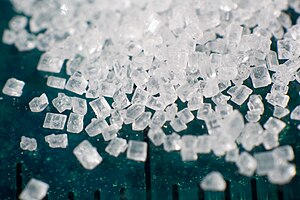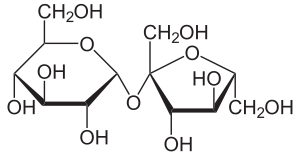Sugar: Short-chain, water-soluble carbohydrate
Sugar is the common name for several chemical substances, some of which taste sweet.
Mostly, it refers to sucrose, lactose, or fructose. Sugar is in certain kinds of food, or it is added to make it sweeter.

Regular or pure sugar, or sucrose, is extracted from sugarcane or sugar beet. Brazil produces the most sugar per person and India's total consumption of sugar is the highest for a country. Fructose is the sugar that is in fruits.
Sucrose and fructose are both made by two smaller sugars. Glucose is the more common of these smaller sugars. The human body changes regular sugar into the smaller sugars.


Sugars are a kind of carbohydrate. That is, sugars are made from carbon, hydrogen and oxygen. Carbohydrates can be simple carbohydrates or complex carbohydrates. Simple carbohydrates are made of only one or a few of the smallest sugars. Complex carbohydrates are made of many of the smallest sugars.
Sugar can be different colors. For example, brown sugar has molasses in it, and is often used in baking.
There are 387 calories in 100 g of sugar.
Production
Sugarcane
| Sugarcane production – 2020 | |
|---|---|
| Country | Millions of tonnes |
 Brazil Brazil | 757.1 |
 India India | 370.5 |
 China China | 108.1 |
 Thailand Thailand | 75.0 |
| World | 1,870 |
| Source: FAOSTAT, United Nations | |
Global production of sugarcane in 2020 was 1.9 billion tonnes, with Brazil producing 40% of the world total and India 20% (table).
Sugar cane can be any of many species, or their hybrids, of giant grasses in the genus, or group Saccharum in the family Poaceae. They have been grown in tropical climates in the Indian subcontinent and Southeast Asia over centuries for the sucrose found in their stems.

Sugar cane needs a climate with no frost, with enough rain in the growing season so that the plant grows. It is harvested by a machine or by hand, and cut into pieces and is moved to the processing plant where it is milled. The juice is extracted with water or it is extracted by diffusion. The juice is clarified with lime and heated to destroy enzymes. The thin syrup result is concentrated in evaporators, after then water is removed. The supersaturated solution is added with sugar crystals, making crystals and drying easier. Molasses, fiber from the stems, is burned to give energy for the sugar extraction process. The raw sugar crystals have a sticky brown coating and may be bleached by sulfur dioxide, or may be treated in a carbonation process to make it whiter. About 2,500 litres (660 US gal) of water is needed for every one kilogram (2.2 pounds) of sugar to be produced.
Sugar beet
| Sugar beet production – 2020 | |
|---|---|
| Country | Millions of tonnes |
 Russia Russia | 33.9 |
 United States United States | 30.5 |
 Germany Germany | 28.6 |
 France France | 26.2 |
| World | 253 |
| Source: FAOSTAT, United Nations | |
In 2020, global production of sugar beets was 253 million tonnes, led by Russia with 13% of the world total (table).
Sugar beet is harvested during cool seasons, and then a rotor beater cuts off the head of the beet, which then is then left in the field. A beet loader pulls the beets out of the earth and into a truck, where the beet is driven to a processing plant. The processor slices the beets into thin chips called cossettes. The extraction takes place in a diffuser where the beet is kept in contact with hot water for about an hour. The diffuser is a large agitated tank in which the cossettes slowly move from one end to the other as the water is moved in the opposite direction. This is called counter-current flow and as the water goes it becomes a stronger and stronger sugar juice.
History
In around 8,000 BC, people in New Guinea and Polynesia had sugar cane where it had then came to Asia. With interest of the people who had discovered it, sugar cane and it's practices of planting sugar cane had gone to Southwest Asia, including China and India.
In 510 BC the Persia (Iran), Emperor Darius invaded India where he found cane sugar which was named "the reed which gives honey without bees". The growing was kept unknown and showing the sugar for a rich profit. The Arab invasion of Persia in 642 BC, sugar cane refining techniques had been added by Eastern Mediterranean people.
Records from the Ancient Greeks and Romans would suggest that sugar cane was used in medicine. In around 350 CE, Indian people discovered how to crystallize sugar. Around 650 CE, crystallized sugar became a culinary staple across India, China, and the Middle East.
Related pages
Notes and References

This article uses material from the Wikipedia Simple English article Sugar, which is released under the Creative Commons Attribution-ShareAlike 3.0 license ("CC BY-SA 3.0"); additional terms may apply (view authors). Content is available under CC BY-SA 4.0 unless otherwise noted. Images, videos and audio are available under their respective licenses.
®Wikipedia is a registered trademark of the Wiki Foundation, Inc. Wiki Simple English (DUHOCTRUNGQUOC.VN) is an independent company and has no affiliation with Wiki Foundation.